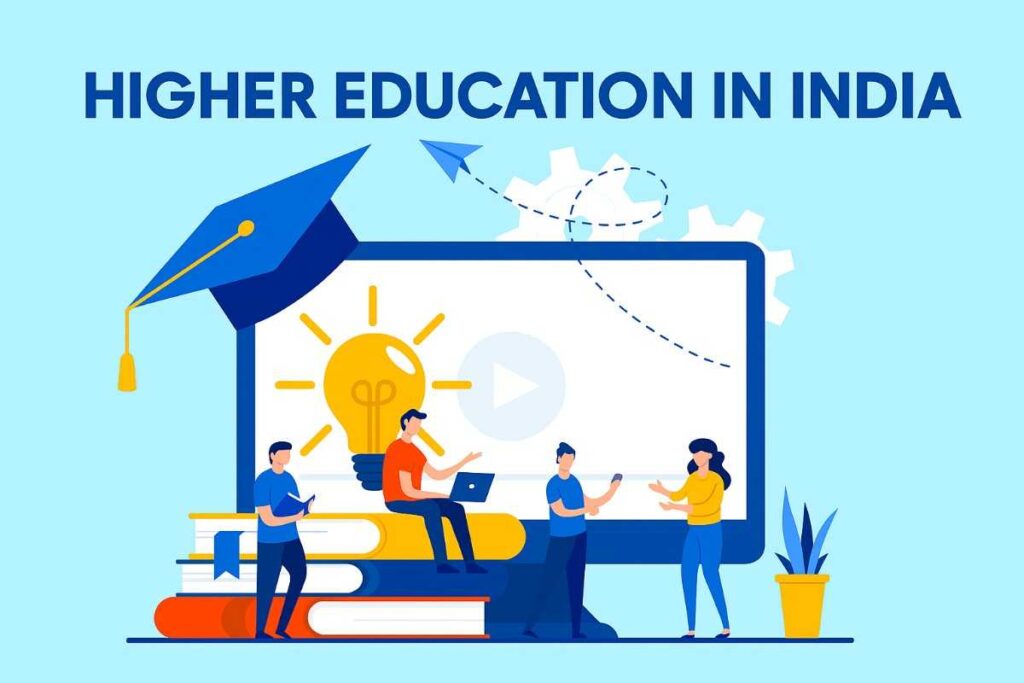BLOGS
Higher Education in India: Opportunities and Growth

Education in India has been evolving and transforming to adapt to the changing times. The National Education Policy 2020 is a testament to this. The integration of technology into education, the importance of extracurricular activities, the provision of vocational training and the emphasis on mother tongue exemplify the paradigm shift from traditional to hybrid models of education.This blog provides a comprehensive overview of the higher education system in India, opportunities, growth, challenges and future.
Overview of Higher Education in India
The terms secondary and higher education are interchangeably used in India. Higher education is an umbrella term that includes education provided by universities, colleges, institutions of national importance, and technical and professional institutions.
Role of Central and State Universities
Central universities are set up by an act of Parliament while state universities are established by respective state legislatures. The main goal of these institutions is to offer quality and affordable undergraduate, postgraduate and doctoral programs. These universities are crucial in shaping higher education as they set standards, promote research and cater to the local educational needs of students.
Importance of Private Institutions in Higher Education
The private institutions design the curriculum by themselves, keeping it updated and innovative. They offer diverse programs with state-of-the-art infrastructure, fostering creativity, collaboration and skill development. The quality of education provided by certain private institutions is on par with international standards. They complement the education provided by government colleges.
Also: Explore New Horizon College, Marathahalli
Growth of Higher Education in India
The heightening of higher education in India can be witnessed through:
- Increased enrollment rates
- Provision of diverse courses
- Well-equipped infrastructure
- Impetus to vocational education
- Adoption of interdisciplinary approach
- Expansion of digital learning tools and platforms
Opportunities in Higher Education in India
There are diverse academic options available through India’s higher education system in fields like medicine, engineering, research, architecture, data science, technology, environment, arts, law, etc.
The career opportunities are distinct, including both traditional and modern roles like:
Traditional professions |
|
Modern careers |
|
Challenges Facing Higher Education in India
Higher education in India is met with challenges that hinder growth in the educational sector:
- The cost of affording quality educational institutions still remains high, creating a socio-economic disparity.
- Assuring high-quality education consistently has become a problem in several institutions.
- High teacher-to-pupil ratio hampers individual care and support.
- Limited investment in the education sector impedes research and innovation.
- Outdated curriculum makes students unemployable.
- Inadequate number of accredited institutions.
- Lack of skills and practical knowledge among youth.
To overcome these obstacles, the following measures can be taken:
- Expanding access to quality education for disadvantaged groups by increasing the scholarships, reducing fees, etc.
- More funds should be allotted for research, setting up new universities, and enhancing infrastructure quality.
- Vocational training should be provided to students to make them industry-ready.
- A similar and stringent accreditation framework has to be followed to rate the institutions.
- Increase the integration of technology to reduce the cost of education and offer personalized learning experiences.
The Future of Higher Education in India
The National Education Policy 2020 has introduced new provisions and updated a few to revolutionize higher education in India. Hybrid learning, multidisciplinary approach, skill-focused initiatives, vocational education and industry-aligned curriculum are some of the transformative shifts made to produce skilled graduates.Use of technology will grow multifold in the form of smart classrooms, massive open online courses (MOOCs), online learning platforms, etc. Collaboration of Indian institutions with global universities is also gaining prominence. An advancement in the infrastructure is also expected in the coming years due to increased government and private funding.
Conclusion
Education is the driver of progress in a country. It has the power to uplift and transform the lives of people. Higher education in India has seen tangible progress with the introduction of scholarships, reservations, and government schemes. The need of the hour is to give higher education a further push by introducing reforms through upgrading the curriculum, focusing on skill development and modernizing the infrastructure.
Check: How to Achieve Your Career Aspirations?
The landscape of higher education in India is evolving with increased opportunities in tech and commerce. Combine this with knowledge about AI in education and professional courses after 12th commerce for a complete picture. Explore best degree colleges bangalore or specialized bcom colleges in bangalore to take the next step.
Frequently Asked Questions (FAQs)
- What are the Key Opportunities Available in Higher Education in India?
Research, PhD courses, global collaborations, and partnerships with industries for skills development are some of the key opportunities available in higher education in India. - How has Enrollment in Higher Education Increased in India in Recent Years?
The reforms introduced in the education system have promoted digital access, inclusivity, affordability and last-mile delivery of resources. Government initiatives and scholarships have played an important role in increasing the enrollment roles in higher education in recent years. - What Role Do Private Institutions Play in India’s Higher Education Landscape?Private institutions in India have state-of-the-art infrastructure, foster research and innovation, provide vocational training, offer diverse courses, and have updated curriculum. They have significantly expanded higher education in India, complementing the efforts of the government.
- How is Online Learning Impacting the Future of Higher Education in India?
Online learning has improved accessibility, offered flexible learning methods and reduced the cost of learning. Students can learn new skills through online courses on various online platforms.


